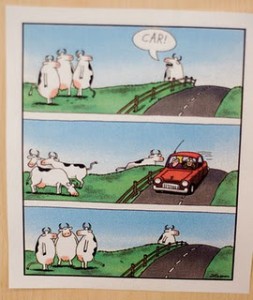I didn’t give up meat just because Bill Clinton did. I gave up meat because of ads posted on the subway featuring puppies and kittens beside other baby animals with the caption: “Why Love One But Eat the Other?”
I have a dog and a cat that I love and I would never eat either of them. Not even a nibble. As supposed hypoallergenic breeds, they were both really expensive! So right there, between Wellesley and Bloor station, without any other consideration or research, I decided not to eat meat again.
My attempt to go veg, however, has not been easy. Having always been a true meat and potatoes girl, I find myself desperately craving a good hamburger. I have been chronically tired since I ate my last one three years ago. I find myself dreaming about thick, juicy patties, sandwiched between enriched white flour buns, that no amount of tofu or lentils can satisfy. I share my name with a burger chain for goodness sakes! I have always prefered steak over salad and I think it was my carnivorous tendencies that endeared me to my husband in the first place. That I now make quinoa as a main course (or at all) is a pretty terrible bait and switch. A girl can’t go around ordering rare sirloins for breakfast, lunch and dinner, only to pledge allegiance to Gary Larson’s subjects once she says “I do.” It’s just false advertising.
Even more than my life-threatening iron deficiency, total lethargy and grievous pre-marital misrepresentation, however, is my discomfort in telling people I’m a vegetarian. While many people feel good about their commitment to a belief or cause and are happy to vocalize any perceived contribution to the environment, I often find it embarassing. Like recycling. When, at a wedding, I have to lean in and ask a waiter if there is a vegetarian option, I can barely bring my voice above a whisper. I’m concerned about sounding pretentious or (shudder!) self-righteous. I find myself wanting to explain, to tell the other guests at the table that it’s just an allergy. “I can’t digest meat!” I want to yell, “I’m just like you!”
I feel even worse speaking to other vegetarians. Exchanging emails with a friend who has recently given up meat, I was so impressed with her wealth of information. Before making the decision, she had read dozens of books on the subject, met with a doctor and really considered the health implications for her and her family. She’s taken the time to make informed choices and structure her eating habits to ensure she is getting the proper proportions of vitamins and nutrients, sans meat. I, on the other hand, watched a single interview with Dr. Colin T. Campbell, one of the first advocates for a plant-based diet, after I had already made the switch. The interview was on Real Time with Bill Maher.
“Have you read Dr. Campbell’s China Project?” I asked my friend, “apparently he says there’s a real link between animal-based foods and chronic disease.”
“It’s called the China Study,” she said.
Right.
Now having the proper source to google, I’ve been taking the time to read up a little more about Dr. Campbell’s philosophy and was pleased to learn, in a New York Times interview, that he too is uncomfortable with vegetarianism:
“I don’t use the word “vegan” or “vegetarian.” I don’t like those words. People who chose to eat that way chose to because of ideological reasons. I don’t want to denigrate their reasons for doing so, but I want people to talk about plant-based nutrition and to think about these ideas in a very empirical scientific sense, and not with an ideological bent to it.”
http://well.blogs.nytimes.com/2011/01/07/nutrition-advice-from-the-china-study/
I don’t want to have an ideological bent towards not eating animals either. So now, when people ask me about my dietary decision, I just quote writer A. Whitney Brown: “I’m not a vegetarian because I love animals. I’m a vegetarian because I hate plants.”




![Am I Doing Everything Right to Become a Mother This month for fertilty matters, I wonder if I’ve done everything right to become a mother or if I drank too much coffee. You can check out my post here: […]](http://sadinthecity.com/wp-content/uploads/2015/07/IMG_05621-100x100.jpg)
![Writing for Fertility Matters – Smile Though You’re Infertile I am honoured to be contributing to Fertility Matters, a national organization that empowers Canadians to help reach their reproductive health goals by providing support, awareness, information and education; and […]](http://sadinthecity.com/wp-content/uploads/2016/06/StephenWendyDiego-100x100.jpg)

![Letting Go of Biological Motherhood I take my dog, Diego, for a walk over my lunch break hoping some fresh air will do me good. I’m in my new uniform: torn Joe Fresh sweatpants shoved […]](http://sadinthecity.com/wp-content/uploads/2016/03/fertilifucked2-100x100.png)
![I’m Expecting….A Web Series! I am so excited to share with you that I’m expecting…. a web series! Here is the trailer for How To Buy A Baby: https://www.youtube.com/watch?v=sLqSlmok9KA My team and I are […]](http://sadinthecity.com/wp-content/uploads/2016/03/prego-announcement-100x100.jpg)


![I am a Grown-Up! Even if my Nieces Don’t Think So… I begin to suspect my nieces, 12 and 9, don’t quite see me as a grown-up when I get a text from one while she is playing at the park […]](http://sadinthecity.com/wp-content/uploads/2015/10/aunt-big-deal-100x100.jpg)
![The Dialogue Project I am honoured to have contributed a piece to the Dialogue Project, a social mission dedicated to raising funds and awareness about mental illness. You can check out my post […]](http://sadinthecity.com/wp-content/uploads/2015/10/dialougeproject-100x100.png)


This is one of your funniest posts as of yet! I totally relate to the embarrassment of saying to waiters, family or friends that I’m a vegetarian. I now say things like, “I’m exploring a veg diet”. It seems like less of a commitment.
Thanks for this one, Wendy.
Your’e brilliant! Can I borrow your line? I love it. I too “am exploring a veg diet.” I’ll be sure to quote you, I promise. I am so happy you liked the post.
Hahahaha! Hate plants! What a great response.
I’m a coward. When I’m out, I just order a salad. No explanations necessary.
I need to take a page out of your book Diane! Not just in skipping the explanation, but in ordering more salad. I’m too busy eating up the bread basket!
I think we’ve been vegetarians around the same length of time. I don’t miss it because it made me feel lethargic and heavy. As a vegetarian, however, I’m constantly hungry, especially when I go all raw and start juicing. I started this week, thinking even a piece of cardboard may taste good right about now. As a matter of fact, I just had dinner about half an hour ago and I’m feeling hungry again.
I hear you Totsymae! I’m too am always hungry. I read your comment and thought, “mmmmm cardboard!”
I so don’t regret to leave my life of Vegetarianism (after 15 years) and enter a life of carnivorous activity. . .I’m just upset we can’t share the experience.
Without saying it, I have sort of turned vegan…with a once every six months splurge to a burger that tastes like a million bucks smothered in catsup, and with a side of fabulous fries. I live for that day when I can toss my vegetarian ways to the curb and bite down on that thick patty with cheese! Very funny post. Love how you tackle this subject.
This is awesome!!! I would become a vegetarian if I had to be the one hunting my food. I know where it comes from and how, I just dont have to do it….so….bring on the beef, chicken and sushi 🙂 I have cut back immensly on beef because too much of it really isnt good for you but I cant leave any of my meat completely. Besides, my local sushi chef would miss me.